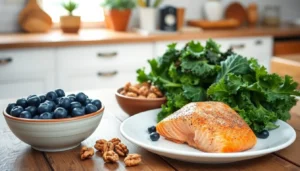In a world where kale reigns supreme and quinoa is practically a household name, natural food substitutes are the unsung heroes of the culinary universe. They’re the stealthy sidekicks that swoop in to save meals from the clutches of artificial ingredients and processed foods. Who knew that swapping out butter for avocado or sugar for honey could turn your kitchen into a health-conscious haven?
Table of Contents
ToggleWhat Are Natural Food Substitutes?
Natural food substitutes refer to ingredients that replace processed or artificial items, fostering healthier dietary choices. These alternatives improve nutrition while maintaining the flavors and textures of traditional recipes. Whole foods and minimally processed options often act as effective substitutes.
Examples include replacing refined sugar with maple syrup or coconut sugar. These alternatives provide sweetness along with vitamins and minerals, unlike their processed counterparts. Similarly, individuals can swap dairy milk with almond, soy, or oat milk, reducing lactose intake and catering to various dietary preferences.
Nut butters, like almond or cashew butter, can substitute for margarine or processed spreads. They offer healthy fats and protein without artificial additives. Also, using Greek yogurt in place of sour cream adds creaminess while increasing protein content.
Fruits serve as versatile substitutes. For instance, bananas can replace eggs in baking, providing moisture and binding properties. Moreover, cauliflower serves as a popular base for low-carb dishes, such as cauliflower rice or pizza crusts.
Whole grains like quinoa or brown rice can replace white rice or refined pasta, delivering higher fiber and nutrient levels. Additionally, legumes such as lentils or chickpeas can take the place of meat in various recipes, enhancing protein intake for vegetarian or vegan diets.
These swaps promote a cleaner diet, emphasizing natural ingredients over processed ones. Incorporating these substitutes leads to flavorful meals that support overall well-being. Each substitution not only enriches nutritional value but also encourages culinary creativity.
Benefits of Using Natural Food Substitutes

Natural food substitutes offer numerous advantages, improving health and promoting sustainable practices. These swaps frequently lead to healthier dietary options.
Health Benefits
Using natural food substitutes enhances overall well-being. Ingredients like avocado instead of butter provide healthy fats. Replacing refined sugar with maple syrup or coconut sugar lowers glycemic index, benefiting blood sugar levels. Incorporating almond, soy, or oat milk in place of dairy milk delivers lactose-free alternatives and nutrients. Substituting nut butters for margarine adds protein and healthy fats. These overarching benefits support heart health and weight management while minimizing exposure to additives and preservatives.
Environmental Impact
Opting for natural food substitutes significantly reduces environmental footprints. Choosing plant-based options like legumes for meat lessens greenhouse gas emissions. Almond, soy, or oat milk requires less water compared to dairy farming, supporting water conservation efforts. Swapping refined grains for whole grains encourages sustainable agricultural practices. Natural ingredients often come from local sources, decreasing transportation emissions. Collectively, these choices promote ecological sustainability, foster biodiversity, and contribute to a healthier planet.
Common Types of Natural Food Substitutes
Natural food substitutes provide various healthy options that enhance nutrition while maintaining flavors. This section explores some common types that easily fit into meals.
Dairy Substitutes
Almond milk, coconut milk, and soy milk serve as popular alternatives to dairy milk. Many prefer these substitutes for lactose intolerance or dairy allergies. Greek yogurt often replaces sour cream, delivering a similar texture with added protein. Nutritional yeast acts as a cheesy flavor enhancer in dishes. Furthermore, cashew cream provides a rich, creamy base for sauces and soups, proving ideal for vegan recipes.
Meat Alternatives
Legumes like lentils, chickpeas, and black beans offer high protein content, making them effective meat substitutes. Quinoa stands out as another protein-rich option, often used in various dishes. Seitan, derived from wheat, mimics meat texture and absorbs flavors well. Moreover, jackfruit serves as a versatile substitute in tacos and sandwiches, delivering a pulled meat texture. Tofu and tempeh also fulfill protein needs in vegetarian and vegan diets.
Sweetener Alternatives
Maple syrup and coconut sugar replace refined sugar in recipes, adding unique flavors. Honey works well in baking and cooking, providing natural sweetness. Stevia and agave nectar act as low-calorie sweetening options, appealing to health-conscious individuals. Date syrup offers another natural alternative, packed with nutrients and fiber. Lastly, ripe bananas blended into recipes provide natural sweetness while enhancing moisture in baked goods.
Tips for Incorporating Natural Food Substitutes
Incorporating natural food substitutes into cooking promotes healthier meal options while enhancing flavors. These tips streamline the transition and improve overall nutritional value.
Choosing the Right Substitute
Selecting the appropriate substitute involves understanding flavor profiles and textures. For creaminess, Greek yogurt serves as an excellent option to replace sour cream. When baking, mashed bananas can effectively take the place of eggs, adding moisture and sweetness. Almond milk works best as a dairy milk alternative due to its light flavor. Consider the dish’s final consistency when replacing ingredients. Coconut sugar offers a similar sweetness to refined sugars without the negative health effects. Each food substitute enhances taste while providing additional health benefits, catering to dietary preferences.
Recipes Using Natural Food Substitutes
Exploring recipes featuring natural food substitutes encourages culinary creativity. A smoothie recipe can incorporate spinach, banana, and almond milk for a nutrient-rich breakfast option. For lunch, a quinoa salad topped with avocado, black beans, and lime dressing offers a protein-packed meal. In baking, using oat flour in place of all-purpose flour produces a heartier texture in muffins. A vegetable stir-fry can include cauliflower rice as a low-carb base, enhancing flavors while being nutritious. Each recipe showcases the versatility of natural substitutes, making it easier to enjoy healthy and delicious meals.
Natural food substitutes offer a practical way to enhance meals while prioritizing health and sustainability. These ingredients not only provide nutritional benefits but also support culinary creativity. By making simple swaps, individuals can enjoy familiar flavors without compromising on well-being.
Embracing these alternatives fosters a cleaner diet and contributes to environmental sustainability. As more people seek healthier lifestyles, incorporating natural substitutes becomes essential in modern cooking. This shift not only benefits personal health but also promotes a more sustainable planet for future generations.





